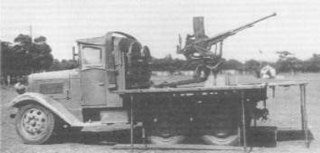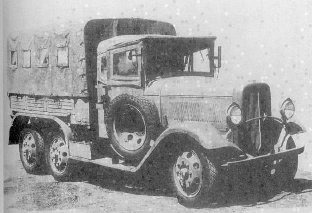 W
WThe AA Machine Cannon Carrier truck was a self-propelled anti-aircraft gun of the Imperial Japanese Army. It consisted of the Type 98 20 mm AA machine cannon mounted on the back of a Type 94 6-Wheeled Truck. The Type 94 truck was first produced in 1934 by Isuzu, and used for prototypes. It was known to be reliable and was produced in "large numbers".
 W
WThe 40M Nimród was a World War II Hungarian self-propelled anti-aircraft gun based on a license-built copy of the Swedish Landsverk L-62 Anti I SPAAG but with a new turret, and developed independently. Originally, it was intended to be used both in the anti-aircraft and tank destroyer roles, but it proved to be ineffective against Soviet tanks like the KV-1 tank. Therefore, it was primarily utilized against lightly armored vehicles and for air defense.
 W
WLandsverk L-62, also known as Landsverk Anti II or a combination of both, Landsverk L-62 Anti II, was a Swedish self-propelled anti-aircraft gun construction that was specifically designed for Finland by Landsverk between 1941 and 1942.
 W
WTank AA, 20 mm Quad, Skink was a Canadian self-propelled anti-aircraft gun, developed in 1943–44, in response to a requirement from the First Canadian Army. Due to a lack of threat from the German Luftwaffe, the Skink was cancelled in 1944 after only 3 were built.
 W
WThe Type 96 AA Gun Prime Mover is a Japanese 6-wheeled prime mover used during the Second World War. In entered service in 1937.
 W
WThe Type 98 20 mm AA half-track vehicle was an experimental Japanese self-propelled anti-aircraft gun. It had a single 20 mm Type 98 AA cannon mounted on the back section of a Type 98 4-ton half-track. The modified vehicle used was designated the Type 98 Half-tracked Prime Mover Ko-Hi. The Type 98 Ko-Hi was first manufactured in 1938 by Isuzu.
 W
WThe Type 98 20 mm AAG Tank was a Japanese self-propelled anti-aircraft gun using a twin Soki Type II 20 mm anti-air gun. They were combined with the chassis of the Type 98 Ke-Ni. The gun crew worked from a raised platform with a modest amount of protection from the sides - the twin 20 mm gun fired through a large Gun shield gave further protection for the crew from that direction.
 W
WZSU-37 was a Soviet-made, light, self-propelled anti-aircraft gun (SPAAG), developed by the end of 1943 and produced at Works No. 40 in Mytishchi. It was the first Soviet series-produced tracked SPAAG. ZSU stands for Zenitnaya Samokhodnaya Ustanovka, meaning "anti-aircraft self-propelled mount".